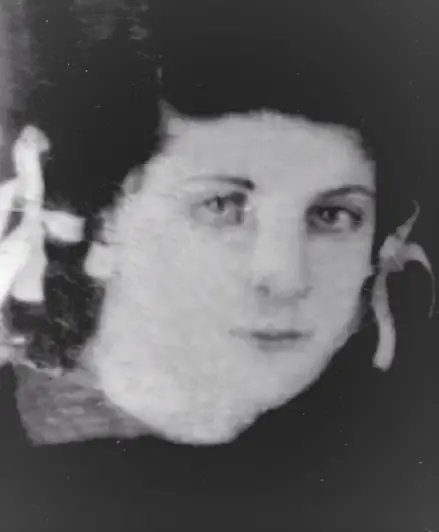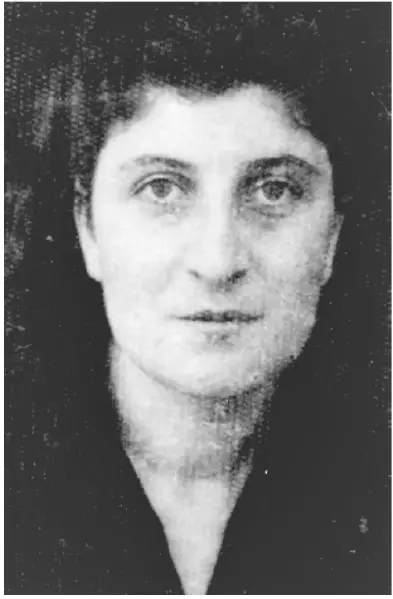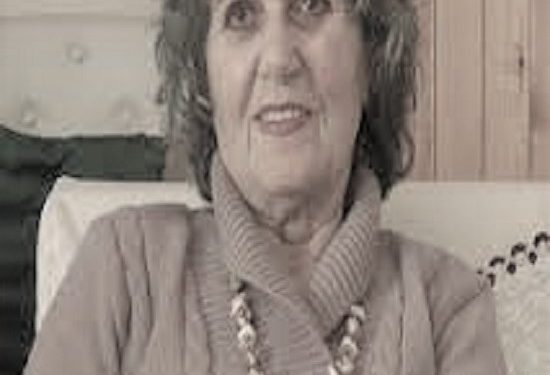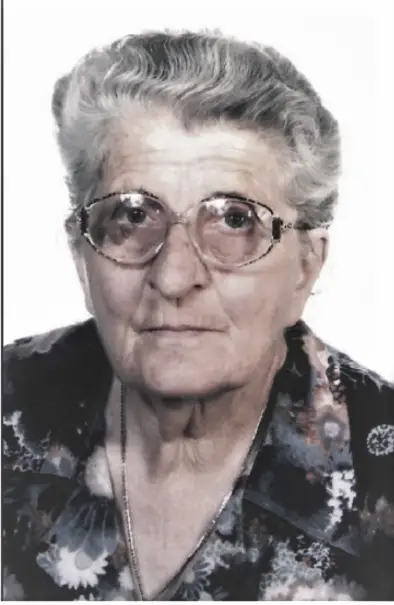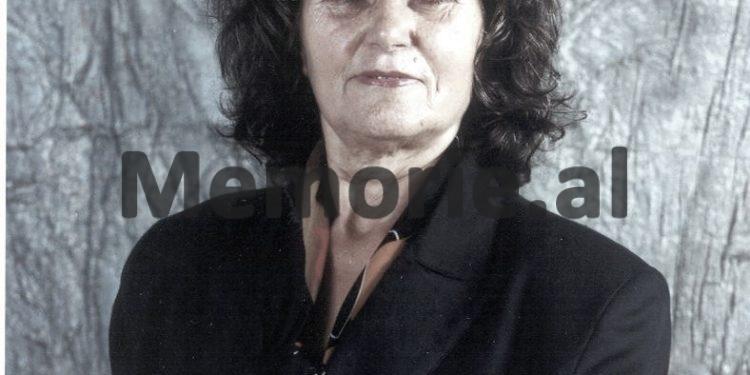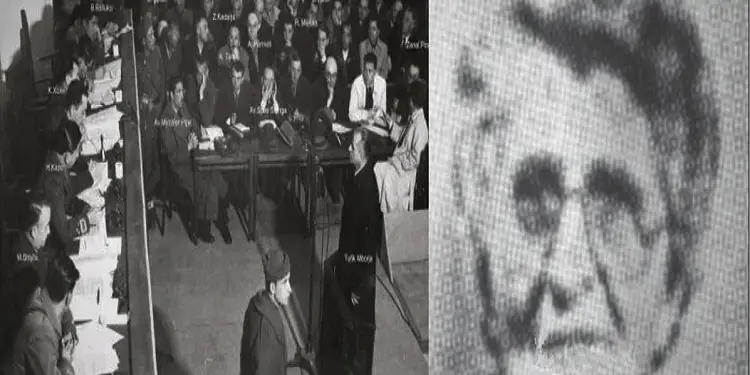By Fatbardha Mulleti Saraçi
Memorie.al / Mrs. Ana Daja is a woman who enjoys good health for her age, she is a lady who is as loving as she is strong, full of life. During the conversation with him, about the years of her youth, she recalls her stories, painful, full of suffering, with a lot of torture, with a wonderful memory. It shows every story, every detail and the names of his co-sufferers, but also of those who tortured him. She was born in Shkodër in 1928, in a family of workers, her father worked as a tinsmith and sheet metal worker and they had a rather good economic situation. She continued primary school and high school, in the state school at the “Donika Kastrioti” Institute. In 1944, she was in the fifth year of school; the lesson was closed, since it was only three months of summer. In 1946, she went to the “28 November” state high school in the city of Shkodra.
Ms. Ana, how do you remember Shkodra in the years 1945-46 and onwards?
Shkodra was beautiful, with courtyards full of flowers, but it was filled with prisons, there were about 20 of them. At the beginning of 1945, the first clerics began to be arrested. We students would run away from class and go to the “Rozafa” cinema, because their trial was taking place there. I was not allowed to enter the hall (it was filled by their people, who were authorized). We went with them, and leaving the court, many communist women and young people shouted through the main streets: “Bullet on the forehead and on the rope, enemies of the people”.
What happened to you at the end of 1945?
I was the second person in the market of our city; I had bought a piece for a dress. I had the “Daughters of the Lady” badge, while my friend, Marije Prendushi, had that of “Catholic Action”. At this time, the group of “Communist Women” was passing by, shouting: – “Bullet to the forehead and rope to the fascists and reactionaries”. At this moment, Marije Ndoja emerges from the crowd, who came to forcibly remove my badge. I resisted him and did not let him take it from me in any way. The next day at school we were made into a caricature, mocking us with insulting words.
In the 1946 school year, much sabotage was carried out by anti-communists. Ernest Përdoda and I distributed tracts. I was expelled from school for three days because I had torn up the school newspaper, where they mocked me with insulting words. In that period, Dom Gaspë Thaçi – Archbishop of Shkodra died, I attended his funeral. During the funeral, the police car had blocked the road, so that the carriages accompanying the funeral would not pass, but the youth, who had left school, carried the carriage with the coffin and carried it uphill, without the need for horses, and continued the funeral.
At that time, in the gymnasium hall of B.R.A.SH. (“Albanian Anti-Fascist Youth Union”), conferences against religion were organized and Satber Jubani presided over them. I have always opposed them, coming to the defense of people of religion and religious belief. Once there was a big meeting in the high school gymnasium and the representative of the Ministry of Education, Spiro Pano, came for the anti-communist activity that took place in the high school. We were expelled from schools all over Albania, me, Faik Lulin, Njazi Barbullushi, Sandër Gerë, etc.
What else happened to you on June 26, 1947?
In the afternoon of June 26, 1947, Dylaq Lekiqi knocked on the door with two policemen, who came to arrest me, but under the pretext that they allegedly wanted to interrogate me. At the Church’s house, there was the Department of Internal Affairs and there they put me in a room and left me on the cement, where I spent the whole night. The president of the Shkodra branch was Zoi Themeli. From the window of the room, after midnight, I saw Father Mati Prendushi, with a half-torn shirt and long pants tied by his hands behind, in a tree, after he had been tortured.
A heavy rain started and he was left tied up. On the second night, they put me under the stairs, in a small dungeon. Dul Rrjolli tells me: Now we have found the suitable place. There were rats and insects in that dungeon. It was a horror. They put me in the investigator where General Zoi Themeli and Fadil Kapisizi told me: – “You organized high school students, against the people’s power”.
I answered: We are a few girls now, we have just joined the gymnasium and I didn’t get to know them. It’s been a while since I dropped out of school, I didn’t attend high school anymore. Before finishing the speech, they told me: “You organized the funeral of Father Gaspë Thaçi”. I told them that for those three days, I was expelled from school.
After that, Zoi Themeli punched me in the face and his little finger went into my eye, kicked me and knocked me to the ground. Then they took me to the isolation room. On July 15, 1947, the Department of Internal Affairs was rebuilt, which was paved with cement and on that wet cement, mattresses were laid. Everything was wet, not dry; there the date 15.07.1947 was engraved on the wall. The dungeons were without light, without air. Twice in 24 hours, they allowed us to take care of our needs; water was given to us only once a day.
They left me on the cement for a week. The family brought me the mat. The walls and windows were covered with quilts, so that the voices of the tortured could not be heard. One day, the investigator Fadil Kapisizi told me: – “Be ready to show the crimes you committed against the People’s Power, otherwise, we will test you with electric current.” I didn’t speak, I didn’t give any answer. Then the investigator Fadil Kapisizi put the current in both my ears. It was a terrible shock. After that, he told me: “You wanted to kill Dulaqi.”
How could I have killed him…?! I didn’t want to, nor did it occur to me to kill him. What do I kill him with? I don’t have any means, I answered. They always questioned me in the evening. One night, the policeman Ismail, who was young, like a savage, ignorant, missing the thumb of his right hand, said to me: – “Get up” and they sent me to another room, where as soon as I entered, I fell fainting. The counter and floor was covered in clotted blood. Erdh P. K. (prison officer); he tore up Captain Kapysiz’s minutes and said: “From now on you have nothing to do with me”.
He asked me: “You organized the funeral”? I told him that I was three days off. He continued by saying to me: “Tell us the names of the students of the school. You have to accept the charge”? But I told him that I did not know them.
What did Pjerin Kçira do next?
He tied me to the wall behind the door, tied my hands with wire, lifted me up and threw the wire back. I couldn’t move. Every time the door opened, it ran into me and slammed into me, who was tied up. They kept me in this condition for five days and five nights, without eating or drinking. They took me back to the dungeon where they electrocuted me again. From October 1 to 15, 1947, they left me standing, facing the wall, without moving.
When I fell, the guard would throw a bucket of cold water on me to get me back on my feet. Just like me in the corridor, there was Dom Anton Muzaj (the one who replaced Monsignor Thaçi) who had been placed on the stairs going down to the first floor; his head was slightly above the floor of the corridor, where we were. While Father Frano Kir, they had tied him in irons. Every time the guard passed by, he kicked him (Father Frano lifted him up – Mrs. Ana says with tears in her eyes).
Food was often not given to us; they were thrown to the dog. In the place where I was tied, there were bathrooms, where the prisoners were brought with their personal needs. Often different prisoners, when given the opportunity, helped me. Isuf beg Sokoli, when passing to the bathroom, once brought me a glass of yogurt, gave it to me to drink and quickly hid it. Likewise, Zef Zorba, Brahim Sokoli tried to help me, but the lack of water was a horror.
A prisoner in the same room (because we women were left in the same room as the male prisoners), Dodë Zef Tuku, brought me water, left it in the toilet, so that the police wouldn’t see it. In the evening, when the police released my hands, so that I could perform my personal needs, I drank the water in one breath. My hands and feet have been chained. My feet were swollen, cracked and festering. The doctor refused to treat me because he had to send me to the hospital. But they didn’t send me there. The nurse just opened my wound and injected iodine.
They took me to a room where there were two men. Osman Haxhiu (very old) and Dom Zef Tuku. At night, my legs were stuck to the sheets, my temperature went up to 40˚C, and they didn’t give me any medicine. At this moment, they took me to the first floor, where the torture room was, where Pjerin Kçira and Ali Dhunga were waiting for me, where they interrogated me, saying: “Tell us how you organized the groups”? I replied saying that I have not done anything.
After that they put electric wires in both my ears and tied my hands. Several times I got blood from my nose and mouth, at the moment I lost my memory, I had my tongue with my teeth. They put a piece of cloth in my mouth, so that my screams could not be heard. They sat me down on the cement, put the electricity on me and at these moments, insulted me with the dirtiest language.
Ali Djunga, every time I did not accept the accusation, so many times he kicked me on the sole of my foot, which shook my whole body. They tired me so much that I was unable to walk, and two policemen took me upstairs, arm in arm. My roommates cried when they saw me in that state. In addition to numerous tortures from time to time, they cut off my water and food and said: – Didn’t the family bring you anything?
Once, the driver, Ahmet Sufi, tied my hands and feet with the chains they use for towing cars. I didn’t feel like moving. That left me miserable all day. When they questioned me, I said:
– I am unable to stay in the chair, because your driver has tied me with iron chains. (They allegedly played the role of the defendant, while the driver told me: – I was ordered). In December 1947, I was sent to the former Gestapo prison (former school), there I found a young girl, Marije Frisku, the granddaughter of Dom Rrok Frisku. After a long time I met with him, in the big prison of Shkodra.
After a period, they sent me to the Franciscan prison, to the room next to the campanile, near the bell. Guard Hekurani checked our food, but he was sick with tuberculosis and spat on our food. The doors of the room were stained with paint. There I read three poems by Father Donat Kurti, I read them, memorized them and saved them. We often communicated with each other with two taps on the wall.
And he tells me: – I am Pjetri from Vjerdhe, I have Dom Anton Muzaj in my room, he was standing and was sick. He used to say: – I am not fit for trial. They want me to deny the religion of Christ. For religion and country, I do not accept otherwise. The trial took place on January 12, 1948. The group of young people: Ana Daja, Liza Pali, Viktor Kujxhija..! A puppet trial, fake, you didn’t pay attention to what they were saying. Only the names of the students were read…; there was applause from the people in the hall and the sentence was given…! I was sentenced to four years in prison. I did not find out what I was sentenced for!
About the period you were in prison, what can you tell us?
In the prison, they kept us locked in the cell and let us air one hour in the morning and one hour in the afternoon. In prison, we worked, knitting with wool, knitting sweaters, socks, and handing in the work done during the day every night. In 1949, they started taking prisoners from the main prison and taking them to the Department of Internal Affairs.
One day they took me too, covered me with a blanket, left me in a room where two men entered, they told them: – Because you are needy, we will find you a job and you have privileges, just sign the statement here. They (the investigators) told me: – And how many months of prison do you have left? I replied that I have 17 months left. After that, the investigator told me: “If you sign this statement, we can get you released as soon as possible, through amnesty, and you will not spend 17 months, but not even 17 hours.”
I told them that I do not agree in any way, I do not sign the statement, I do not agree to cooperate with you. We, the women of the prison, were not sent to labor camps, but we were involved in cleaning the police premises. After serving the full sentence, four years, I was released from prison. But the outer prison awaited me, that of isolation and surveillance.
About your fellow sufferers, what can you tell us, how do you remember them?
I was in prison: Adile Hasan Boletini – the wife of lieutenant colonel Adem Boletini (killed in the assassination attempt), who was sentenced to 5 years, for not denouncing Jup Kazazi (he was her sister’s husband, who committed suicide, so as not to surrendered to the communists). Likewise, Agime Pipa, a perfect girl in all respects. Very educated, silent, wise, the first intellectual of our Shkodra. They sentenced him to four years and he completed the sentence.
I remember Vitore Kuka, a good girl, a teacher in Breg i Buna. He had a brother, Zef Kukën, a member of the National Front – Shkodër, who was shot by the communists. He was accused of agitation and propaganda. They sentenced him to 5 years, which he served in full. I remember Terezina Palin, a smart, womanly girl. Her arrest was made in Tirana, for political activity, agitation and propaganda, her uncles Dede Thani, Mark Thani, Pal Thani, died in torture from what was done to them in the Security of Shkodra. Terezina and Liza Pali, his nieces, listened to Uncle Pal, tortured. How hard it was for these girls…! Terezina was sentenced to 5 years, which made her complete. Meanwhile, the sister, Liza Pali, was sentenced to three years for agitation and propaganda.
I remember Gjyste Lazrin, from Fishta (Zadrima area), who was accused of helping the fugitives, was the wife of Vasa Toma, killed by the communists. They captured Gjysten, stripped her, and tortured her to reveal her husband’s connections. She refused, she was pregnant. She gave birth to her daughter in prison. They named the girl Vasilika, but they took her away, sent her to Befotrof, where she died. I left him in jail. I remember another, Dila Zef Doda, from the village of Hajmel, was a Mirdite. They shot her husband, her brother-in-law and burned her house. She was the daughter of Bajraktar of Mirdita, they had made her a kulak. They had sentenced him to 12 years. Her children were raised and educated by her mother.
I remember Bardha Krosaj, an educated, good girl. He was from Kačinari, Mirdita. This alerted the fugitives, not to be seen in that area, that it was full of partisans and State Security people. The courier gave him the letter, but he was injured by the Pursuit Forces. They blinded his eyes and took the letter that he had hidden in his chest. Bardha had written on the paper: The area is full of people of the Pursuit, do not approach, because Stalin’s puppies have come…! With this letter, Aranit Çela came and entered the room and asked him: – “Which is the one who wrote Stalin’s puppies”? – Me, – answered Bardha.
Bardha was 19 years old, when she was tortured in Rrëshen, she came to prison as a corpse. The family members did not know where he was. Bardha was very sick with high fever, vomiting, and tuberculosis began. They had ordered that no medical treatment be given to him. So sick, they brought him to our small room, where 14 women and girls lived. We served them and fed them from our food (brought to us by the family). In the last moments of his life, we dressed him in the beautiful coat, which he had a memory of, and that’s how the prison guards took him. That young girl died and was buried at the Rrmaji Catholic Cemetery in Shkodër. I remember another one, Marije Frisku, the granddaughter of Rrok Frisku, sentenced to 3 years. They imprisoned her with her grandmother (she died in prison). We had another one, his name was Nasibe, I don’t remember his last name. She was from Tropoja and she hardly spoke at all, she was very quiet.
I also remember Drita Kosturin, a young girl who became a communist at the age of 15, but then became an anti-communist. He spent his life in prison and exile. We got to know each other, but we were reserved for the fear of spies, who were often in places where you wouldn’t expect them. Drita Kosturi had been left in a room with Hafiz Dërgut and Gjon Serreq, and she said that every time the Hoxha prayed in the ritual of forgiveness, so many times Gjoni sat down and stood up, that they were both tied together.
Mrs. Ana, what else can you tell us about Shkodra prison?
In the prison of Shkodra, Terezina Pali, said that they heard Father Çiprian Nika screaming, when they burned his leg with a red iron and threw salt on it. Father Ciril Cani, they beat him with a stick, so that he walked with great difficulty, as he did his personal needs. Professor Qemal Drachini and Pal Thanin (academic) were beaten and poisoned; they died there in the investigator. Myzafer Pipan, the lawyer, his two legs were burned with pine resin. They suffocated him, until he was unable to walk. Elez Mesi killed him.
Kolec Deda (a well-known merchant) was thrown from the window, saying that he killed himself (in fact, the windows were always closed). Dr. the Spaniard was poisoned and his body was thrown into the Hall of Kiri, while the Security said that he allegedly drank the poison himself! Pjeter Zef Saraçin was sentenced to prison, just because he said an expression to laugh, for humor. They stripped him, tied his hands and feet and threw buckets of cold water…! Mr. Xhevat Dani and Pjetër Saraçi, we often saw them cleaning the yard with a broom and many other jobs.
What happened to you after you got out of prison, how did your life go?
I worked as a laborer all my life in foam concrete. I created a family, raised children, a boy and a girl, now I am a grandmother.
Mrs. Ana, at the end of this interview, I wish your health and life on the road to old age.
I thank you, Mrs. Fatbardha, for taking this initiative and highlighting the crimes of that regime, so that the generations to come will know and this will not be repeated.
Just a short time after this interview with Mrs. Ana Daja, it seems that old age took its toll, as in 2006, she fell ill. Tired and humiliated by what she had endured in the investigation cells and prisons of the communist regime of Enver Hoxha, she closed her eyes on July 18, 2007. Her life is a living example of life under the communist dictatorship, perhaps unique in it all countries of the Communist East. Memorie.al




